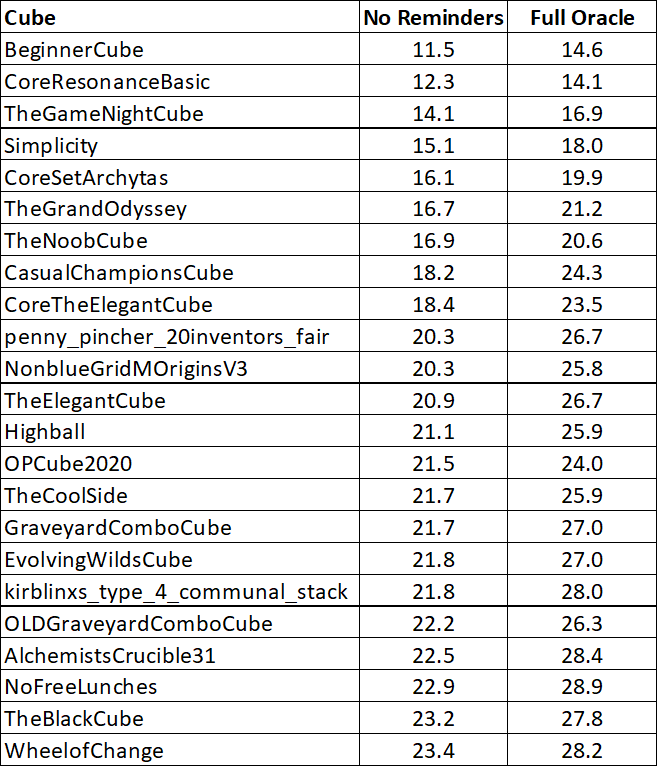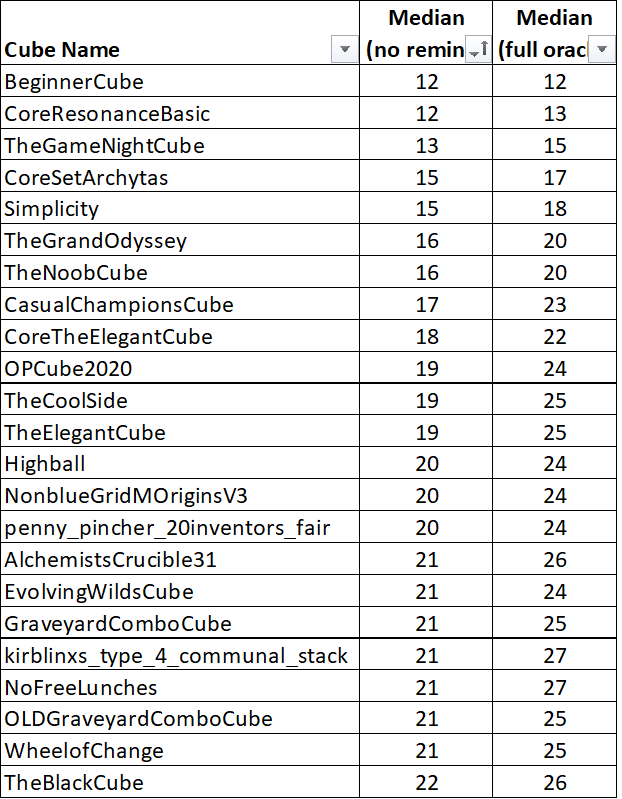import json
from collections import defaultdict
from pprint import pp
def create_cube_json(filename):
# Call this once to create a smaller JSON file from the full card list
# Visit https://scryfall.com/docs/api/bulk-data and look for "Oracle Cards" file;
# Download and rename it to 'oracle_cards.json'
with open('oracle_cards.json', encoding='utf8') as f_oracle_cards:
d = json.load(f_oracle_cards)
f_cube_list = open(filename)
cards = []
for line in f_cube_list:
cards += [line.strip()]
output_filename = filename[:filename.find('.')] + '.json'
f_cube_json = open(output_filename, 'w+', encoding='utf8')
cube_data = []
for card in d:
if card['name'] in cards:
for i in range(cards.count(card['name'])):
cube_data += [card]
elif 'card_faces' in card.keys():
for face in card['card_faces']:
if face['name'] in cards:
cube_data += [card]
string_data = json.dumps(cube_data)
f_cube_json.write(string_data)
f_cube_json.close()
f_cube_list.close()
def wc_fo(text):
# full oracle text word count
return len(text.split())
def wc_o(text):
# word count of oracle text without keyword explanation text
if "(" in text and ")" in text:
p1 = text.find("(")
p2 = text.find(")")
o = text[:p1] + text[p2 + 1:]
return wc_o(o)
else:
return len(text.split())
def word_count(card, full=False):
if full:
wc = wc_fo
else:
wc = wc_o
if 'card_faces' in card.keys():
total_count = 0
for face in card['card_faces']:
text = face['oracle_text']
total_count += wc(text)
return total_count
else:
text = card['oracle_text']
return wc(text)
def cube_word_count(filename, full=False):
with open(filename, encoding='utf8') as f:
d = json.load(f)
wc = []
for card in d:
words = word_count(card, full)
wc += [words]
mean = sum(wc) / len(wc)
if full:
metric = 'Avg Words/Card (full text)'
else:
metric = 'Avg Words/Card (no reminders)'
print(f"{metric}: {mean:.1f}")
return mean
def duplicate_count(filename):
with open(filename, encoding='utf8') as f:
d = json.load(f)
unique = []
for card in d:
if card['name'] not in unique:
unique += [card['name']]
print(f"{len(unique)} unique of {len(d)} total cards")
def print_wordy_cards(filename, n):
# List cards with n or more words
with open(filename, encoding='utf8') as f:
d = json.load(f)
for card in d:
words = word_count(card) # change to word_count(card, True) to count full oracle text
if words >= n:
print(f"{words} words: {card['name']}")
# print(get_text(card) + "\n")
WHEEL = str.maketrans('WUBRG', '01234')
def wheel_order(colors):
return colors.translate(WHEEL)
def print_by_color(filename):
cards_by_color_identity = defaultdict(list)
with open(filename, encoding='utf8') as f:
d = json.load(f)
for card in d:
words = word_count(card) # change to word_count(card, True) to count full oracle text
if 'Land' in card['type_line']:
identity = 'Non-basic land'
else:
identity = ''.join(sorted(card['color_identity'], key=lambda ci:wheel_order(ci)))
cards_by_color_identity[identity].append((card['name'], words))
# pp(cards_by_color_identity)
# sort first by fewest colors in identity, then by WUBRG order
for identity, card_tuples in sorted(cards_by_color_identity.items(), key=lambda t:(len(t[0]), wheel_order(t[0]))):
total_words = sum(words for _, words in card_tuples)
card_count = len(card_tuples)
average_words = total_words / card_count
identity_name = 'Non-land colorless' if not identity else identity
print(f"{identity_name }: average {average_words:.2f} [of {card_count} cards]")
print()
def get_text(card):
if 'oracle_text' in card.keys():
return card['oracle_text']
elif 'card_faces' in card.keys():
text = ""
for face in card['card_faces']:
text += face['oracle_text'] + ' '
return text
cube_name = 'TheElegantCubeCore' # Name must match the *.txt card list file
create_cube_json(cube_name + '.txt') # Comment this out if cubename.json is already created
# print_wordy_cards(cube_name + '.json', 0)
print_by_color(cube_name + '.json')
cube_word_count(cube_name + '.json') # Average words excluding reminder text
cube_word_count(cube_name + '.json', True) # Average words in full oracle text




